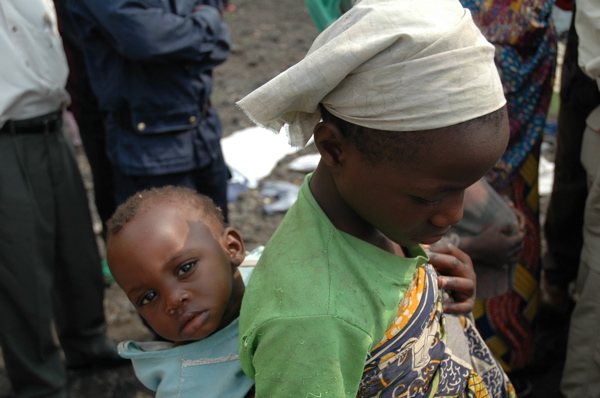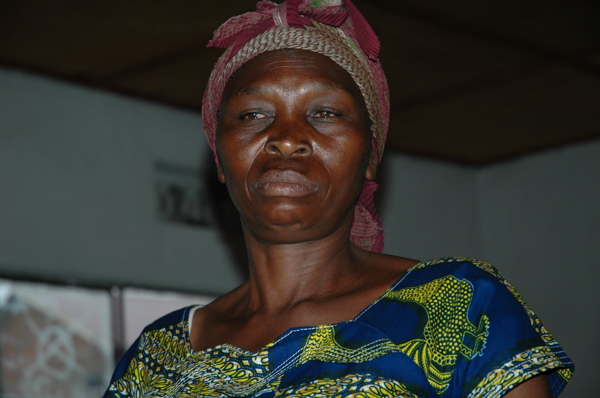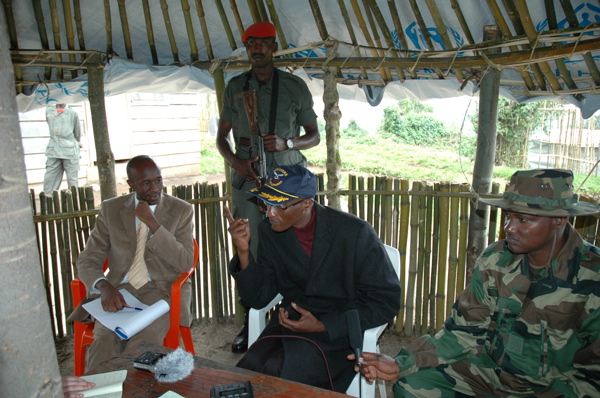
Georgianne what is happening in our mountains is indescribable and the world is watching without a word. Our soldiers are trying to deal with the situation but they have no food, no means for that. As I am writing to you right now Colonel Makenga is trying to organize his troops to stop the FDLR from entering Bukavu they have already gotten to Uvira. Please tell the world what is going on down here since the one who was protecting people was arrested. Be the voice of the voiceless please. We can't let another humanitarian disaster happen as if 1994 wasn't enough. I am sorry I am being emotional...
~Email received from Rwanda/DRC at 8:13 AM Thursday April 9
Today, Human Rights Watch (HRW) is reporting ongoing brutal rapes by Rwandan rebel soldiers and regular Congolese army troops in the eastern Democratic Republic of Congo. Rwandan rebel forces have also been implicated in the deaths of most of the 180 civilians killed since January 23, HRW said in a statement.

Image: IDP camp near Goma, DRC © 2009 Nienaber
The Rwandan Hutu militia called the Democratic Forces for the Liberation of Rwanda (FDLR) attacked and burned dozens of villages and towns in Masisi and Lubero territories (North Kivu) as well as in Kalehe territory (South Kivu) in recent weeks, committing numerous deliberate killings, rapes, and acts of looting. Blaming government military operations, the FDLR deliberately targeted civilians, used them as human shields, and accused civilians of having betrayed them.
"The FDLR are deliberately killing and raping Congolese civilians as apparent punishment for the military operations against them," said Anneke Van Woudenberg, senior Africa researcher at Human Rights Watch. "Both the fighters who commit such horrific acts and the rebel commanders who permit them are responsible for war crimes."
On or about January 22, Tutsi rebel leader Laurent Nkunda of the CNDP (Congress for the Defense of the People) was arrested and detained by Rwandan military forces in Gisenyi, Rwanda. The CNDP maintains that Nkunda protected Congolese people of all ethnicities who lived in the territories under his control, especially against atrocities and violence perpetrated by FARDC and the FDLR. The arrest of Nkunda in an action of apparent betrayal by the government of Rwanda, which had supplied him with aid and logistics, marked the beginning of an unprecedented joint military operation between the governments of Rwanda's Paul Kagame and DRC's Joseph Kabila.
During January and February, according to the HRW report, the FDLR were temporarily held at bay and pushed out of their strategic positions. However, following the withdrawal of Rwandan forces after February 24, the FDLR reoccupied its former positions.
On January 27, HRW reports FDLR combatants "hacked to death dozens of civilians used as human shields at their military position in Kibua." One witness at Kibua interviewed by HRW saw an FDLR combatant batter a 10-year-old girl to death against a brick wall.
The immediate result has been tragic for 250,000 persons who have been added to the already crowded and filthy conditions in IDP camps. In recent weeks rape and murder are increasing.
Most recently, at least seven civilians were killed and 24 others wounded during FDLR attacks in Beni and Walikale in early April. On March 20, 2009, the FDLR attacked Buhuli, North Kivu, and four other nearby villages, killing at least five civilians, including two women, an elderly man, a 7-year-old girl and 9-year-old boy. On February 13, the FDLR attacked the village of Kipopo, killing at least 13 people, who were burned to death in their homes.
In late February, the FDLR abducted at least a dozen women and girls from Remeka, in Masisi territory, North Kivu. Two women who escaped reported that FDLR combatants brutally killed nine of the women and girls when they resisted attempts to rape them. The fate of the others is unknown.
Human Rights Watch also reports atrocities by the regular Congolese army, which has been implicated in numerous rapes.
"In March, Congolese soldiers raped at least 21 women and girls in southern Masisi and northern Kalehe territories. Many of the victims were violently gang raped while the soldiers were on looting sprees.
On March 24, four women from Ziralo, South Kivu, were returning from the market when they were stopped by a group of army soldiers at a makeshift barricade. The soldiers took the sacks of food the women were carrying and then said they were going to examine the women's vaginas for any hidden money. The soldiers took the women into the nearby forest and gang raped each of them for hours. One woman was six-months pregnant and was raped so brutally that she lost her unborn child.

Image: Congolese Midwife and Rape Counselor 2009 Nienaber
According to the United Nations, an estimated 250,000 people have fled their homes in eastern Congo since January, adding to hundreds of thousands of others who fled earlier waves of violence.
A source with the allegedly "repatriated" CNDP army reports today that:
Actually there was no real integration in the regular army our soldiers where forced to join the army after the arrest of the chairman Nkunda. CNDP soldiers agreed to play the path of the peace as it was being preached by Rwanda and Congo. but now it's a totally disaster because they have no food like they used to have, their conditions are worse than when they were in rebellion and because they were trained to protect people, it's difficult to be among those who hurt people(FARDC) and because of that most of them are deserting the army.
The Congolese army says it is preparing for the next phase of operations against the FDLR, this time expanding the operations to South Kivu. The rapidly mixed brigades of former enemies have been sent to the front lines with no salaries, rations, or any formal training, increasing the likelihood of future human rights violations, HRW says.
Serious abuses against civilians by government soldiers have already been reported. Army soldiers killed at least five civilians in Lubero territory in March, some while on looting sprees. In Ziralo, an elderly man was killed by soldiers while they raped his wife and looted his home.
Human Rights Watch decries the fact that there is no formal vetting mechanism to stop those with serious records of past human rights abuses from being promoted and integrated into the Congolese army.
Bosco Ntaganda, wanted on an arrest warrant by the International Criminal Court (ICC) for the war crime of enlisting child soldiers and using them in hostilities, was promoted to the position of general in the Congolese army in January 2009. In addition to the ICC charges, Ntaganda has been accused of commanding troops that massacred 150 civilians at Kiwanja in North Kivu province in November 2008.
Jean-Pierre Biyoyo was recently appointed a colonel in the Congolese army despite being found guilty by a Congolese military court in March 2006 of recruiting child soldiers. He later escaped from prison. Both Ntaganda and Biyoyo play an important role in current military operations.
"Protection of civilians can only be taken seriously if known human rights abusers are removed from the ranks of the Congolese army," said HRW's Van Woudenberg.
As for the fate of Congolese General Nkunda, his attorneys and private counsel have filed applications and protests in Rwandan courts reminding the courts that "it is useful to recall that habeas corpus applications are normally heard within 24 hours."

Image: Nkunda in Interview before his detention 2009 Nienaber
Counsel says that the "arbitrary detention of Laurent NKUNDA MIHIGO, in violation of the fundamental rights of any person present on the territory of the Republic of Rwanda - recognized internationally by, amongst others, the Universal Declaration of Human Rights (Article 9), the International Covenant on Civil and Political Rights (Article 9(1)), the African Charter of Human and People's Rights (Article 6) as well as by the Constitution of the Republic of Rwanda (Article 18) - Counsel for Laurent NKUNDA requested that it be heard on an urgent basis." Counsel also cited Article 89 of the Rwandan Code of Criminal Procedure.
In a nutshell, Rwanda is not abiding by its own Constitution, which the United States and other Western powers hold as a model for the region. The US has just completed work on an $80 million embassy in Rwanda, a country the size of the State of Maryland.
Congo is the size of Western Europe and contains the most strategic store of minerals necessary for the defense industry and telecommunications as well as substantial stores of uranium.
In a complete disconnect regarding realities in this region, Jeffrey Gettleman of the New York Times interviewed Congolese President Joseph Kabila, whom HRW names as an egregious human rights violator, and gave him a free pass. No mention is made of the rapes and killings by Congolese troops in Kivu. Gettleman does manage to get a few laughs from Kabila at Nkunda's expense, and then goes on to discuss Kabila's motorcycles and cars, which the president uses "to blow off steam."
Gettleman has not interviewed Nkunda, nor did he press Kabila on HRW's insistence that Bosco Ntaganda be arrested as a war criminal. There are absolutely no international arrest warrants for Nkunda, nor are there arrest warrants for him in Rwanda or DRC.
Neither did the NYT mention the HRW report "WE WILL CRUSH YOU" which details the Kabila government's use of violence and intimidation to eliminate political opponents. Kabila himself set the tone and direction by giving orders to "crush" or "neutralize" the "enemies of democracy," implying it was acceptable to use unlawful force against them, according to the report.
Meanwhile 250,000 people who were living in their homes before the arrest of Nkunda are now displaced, rape and murder is on the rise, Nkunda, a man with no warrants against him, languishes in detention in a corrupt Rwandan court system, Kabila rules Congo in spite of extreme human rights violations, and a man wanted by the Hague, Bosco Ntaganda is in charge of troops in eastern Congo.
In an OPED in the LA Times, Kenneth Roth of Human Rights Watch also makes the point that Rwanda has been given a free pass for repression because of collective western guilt over the genocide.
